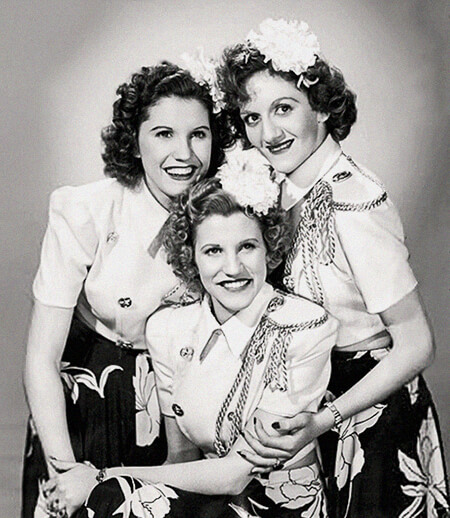
Bebop (Bop) 4
Bebop also challenged the norms of Swing Era commercialism and reflected a new identity politics embodied by the younger generation of musicians. By the end of World War II, the Swing Era had been subsumed by American commercialism and nationalism. Radio advertisements and live performances frequently used jazz to market products, raise national morale, and even sell War Bonds to the American public. As a result, many young musicians felt pressure to replicate the stylistic characteristics expected in the music's commercial environment. Groups such as the Andrews Sisters, with their wartime "swing" feel jingles, epitomized the mainstream codification of swing as a commercial music style, as heard in their recording "Boogie-Woogie Bugle Boy" .
In contrast, bebop redefined jazz's relationship to the mainstream through its subverting of the dominant commercial norms; as Eric Porter argues, "bebop garnered new capital for jazz as a music that spoke to observers of social and cultural resistance" (2002, 54).
One of the earliest historical analyses to interpret bebop in this manner is LeRoi Jones's Blues People: Negro Music in White America (1963). Like other African American cultural critics associated with the Black Arts Movement of the 1960s and 1970s, Jones analyzed the commercial appropriation of swing in racial terms and framed bebop as a strategy to reclaim African American identity within jazz. According to Jones, beboppers developed a highly symbolic "modern" identity that challenged persistent racism in American culture. He claimed that beboppers drew their intellectual sophistication from multiple sources of inspiration, including literature and classical music, and a dialogue with other subcultures active in New York, such as the Beats and Harlem Renaissance writers. In his book Race Music: Black Cultures From Bebop to Hip-Hop, Guthrie Ramsey, Jr, also shows how this sense of "afro-modernism" is intimately connected to the Great Migration (the massive internal migration of African Americans from the rural South to the urban North), the Harlem Renaissance, and a re-theorizing of Black identity that occurred during and after World War II.
Boogie Woogie Bugle Boy
He was a famous trumpet man from out Chicago way
He had a boogie style that no one else could play
He was the top man at his craft
But then his number came up and he was gone with the draft
He's in the army now, a blowin' reveille
He's the boogie woogie bugle boy of Company B
Heebie Jeebies
Say, I've got the Heebies
I mean the Jeebies
Talking about
The dance, the Heebie Jeebies
Do, because they're boys
Because it pleases me to be joy






